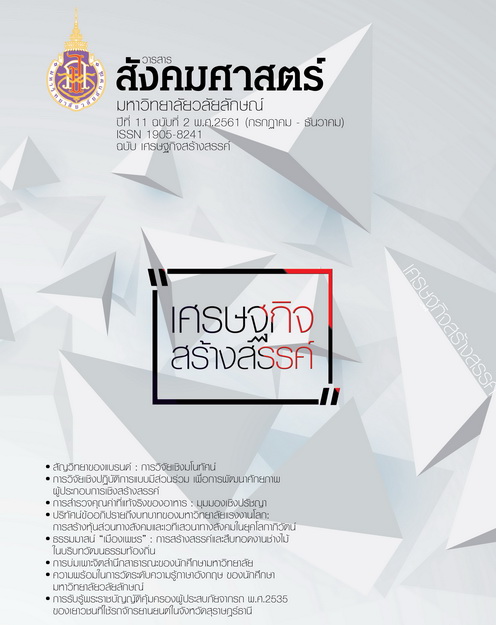Cultivating Public Consciousness of University Students
Main Article Content
Abstract
Public consciousness is a valuable concept, useful for youth development. It is a key component of good citizenship. The purposes of the study are to investigate the characteristics and the public consciousness cultivating process of university students and to propose a data-driven theory of major factors in public consciousness cultivation. The study was designed as a case-based qualitative research with the Grounded Theory for data analysis. The data was collected using the semi-structured interviews of 9 students and 3 administrators and lecturers at a private university in Prathumthani, screened with purposive selection focusing on network or snowball technique. Data collection ended when the data reached theoretical saturation. Data were analyzed by using translation and interpretation. Then, the concepts were created based on theoretical sensitivity. The findings showed that cultivating public consciousness of university students consisted of six factors: meaning making and significance of public consciousness, format of the activities, the initial attraction of public consciousness, the learning outcomes, the spiritual values obtained, and supporting factors and obstacles against public consciousness cultivation. The administrators and lecturers’ views on public conscious cultivation consisted of three main factors: meaning making and significance of public consciousness, the cultivated essence, and supporting factors and obstacles against public consciousness cultivation. When the analyzed themes from the interviewed students and those of administrators and lecturers were matched, four significant factors were identified: the self, the process of public consciousness cultivation, supporting factors and obstacles against public consciousness cultivation, and the spiritual values obtained, which is the most important element for sustainability of public consciousness in students. Suggestions of this study are that the university should have a clear policy in developing student learning and public consciousness in the courses offered. Learning outside class to learn from experiences in real situations as well as cultivating public consciousness through information technology with digital gadgets and social media applications that can be done anytime and anywhere should be promoted.
Article Details
Copyright: CC BY-NC-ND 4.0
References
Bloom, B. S., Englhart, M. D., Furst, E. J., Hill, W. H., & Krathwohl, D. R. (1956). Taxonomy of Educational Objectives: The Classification of Educational Goals, Handbook I:
Cognitive Domain. New York: Longmans Green.
Buosonte, R. (2015). Wičhai chœ̄ng khunnaphāp thāngkān sưksā [Qualitative Research in Education]. Bangkok, Thailand: Chulalongkorn University Press.
Chaiyasarn, W. (2012). čhit sāthārana læ samnưk phonlamư̄ang pathom bot hǣng kānmư̄ang phāk phonlamư̄ang [Public Consciousness and Citizen Recognition the Primary Role of Civic Politics]. Parliamentary Journal, 60(8), 9-27.
Chantavanich, S. (2016). Withīkān wičhai chœ̄ng khunnaphāp [Qualitative Research Methodology]. Bangkok, Thailand: Chulalongkorn University Press.
Glaser, B. G., & Strauss, A. L. (1967). The discovery of Grounded Theory: Strategies for qualitative research. Chicago: Aldine Publishing Company.
Jonassen, D. H. (1992). Evaluating Constructivist Learning. In T. M. Duffy (Ed.), Constructivism and the Technology of Instruction (pp. 137-147). New Jersey: Lawrence Erlbaum Associates Publishers.
Kattiya, K, (2015). Needs for Public Mind Activity Holding of Maejo University Undergraduate Students, Chiang Mai Province. Journal of Liberal Arts Maejo University, 3(1), 58–72.
Khammadee, P., & Pasunon, P. (2015). Motivation on Public Consciousness of Undergraduate Students in Rayong Province. The 6th Hatyai National Conference (pp. 87-95). Hatyai, Thailand: Hatyai University.
Maslow, A. H. (1970). Motivation and Personality. New York: Harper & Row.
McGrattan, C. (2014). An Exploration of Volunteer Experiences for Third Level Students in Ireland from a Student Volunteer and Volunteer Manager Perspective. Dublin Institute of Technology.
McLeod, S. A. (2017). Maslow's Hierarchy of Needs. Retrieved from www.simplypsychology.org/maslow.html
Nakasaney, S., Panjaplinkul, C., & Mo-on, S. (2014). Factors that affected Students’ Public Mind Behavior, Faculty of Liberal Arts, Rajamangala University of Technology Rattanakosin. Nakhon Pathom, Thailand: Rajamangala University of Technology Rattanakosin.
Office of the Higher Education Commission. (2011). Thai Qualifications Framework for Higher Education 2009. Retrieved from http://www.mua.go.th/users/tqf-hed/news/FilesNews/FilesNews2/news2.pdf
Office of the National Economic and Social Development Board. (2017). The Twelfth National Economic and Social Development Plan (2017-2021). Retrieved from http://www.nesdb.go.th/ewt_dl_link.php?nid=6422
Podhisita, C. (2016). Sāt læ sin hǣng kānwičhai chœ̄ng khunnaphāp [The Science and Art of Qualitative Research]. Bangkok, Thailand: Amarin Printing & Publishing.
Pongsritasana, J. (2014). Factors Affecting Public Mind of Rajamangala University of Technology Krungthep Students. Social Sciences Research and Academic Journal, 9(27), 49-62.
Rachjan, P. (2014). The Development of Structural Equation Model of Factors Influencing Self-consciousness Formation of Non-formal Educational Students in the Cluster of Nakhonchaiburin. Buriram, Thailand: Buriram Rajabhat University.
Rukponmongkol, P. (2014). The Causal Factors Affecting the Public Mind Behaviors of Students under Rajbhat University in Thailand. Sripatum Chonburi Journal, 11(1), 34-40.
Seetongdee, P. (2016). A Development of Model to Enhance Public Consciousness for Students in Public university: Srinakharinwirot University. Chonburi, Thailand: Burapha University.
Sinnang, P., Wisetchai, S., & Amnuay, R. (2015). The Public Consciousness of Students Phranakorn Rajabhat University. Bangkok, Thailand: Phranakhon Rajabhat University.
Skinner, B. F. (2014). Science and Human Behavior. MA: The B. F. Skinner Foundation.
Skramstad, M. R. (2014). Students' motivations for volunteering: A study on the motivational factors for volunteering in student unions. EGADE Business School, Mexico.
Strauss, A., & Corbin, J. (1998). Basic of Qualitative Research: Techniques and Procedures for Developing Grounded Theory (2nd ed.). Thousand Oaks, CA: Sage.
Sutthirat, C. (2012). Sō̜n dek hai mī čhit sāthārana [Teaching Children the Public Mind]. Bangkok, Thailand: V Print (1991).
Talab, A. H. (2013). Informal Learning in Youth Volunteer Work: Perspectives from European Voluntary Service Programme. University of Jyvaskyla.
Valeeva, R. A., Koroleva, N. E., & Sakhapova, F. Kh. (2015). Development of The Technical University Students’ Civic Consciousness. Procedia - Social and Behavioral Sciences, 186, 350–353.
Wasi, P. & other. (2000). Khō̜sanœ̄ yutthasāt kǣ wikrit chāt [Strategic Solution to National Crisis]. Bangkok, Thailand: Community Development Institution.
Wattanasiritham, P., & Sanjorn, S. (2000). Samnưk Thai thī phưng prātthanā [Thai Desirable Realization]. Bangkok, Thailand: October Printing.
Wongpitak, T. (2013). Effect of Psychosocial Factors to Volunteer Spirit Behavior of Undergraduate at Srinakharinwirot University. Bangkok, Thailand: Srinakharinwirot University.


